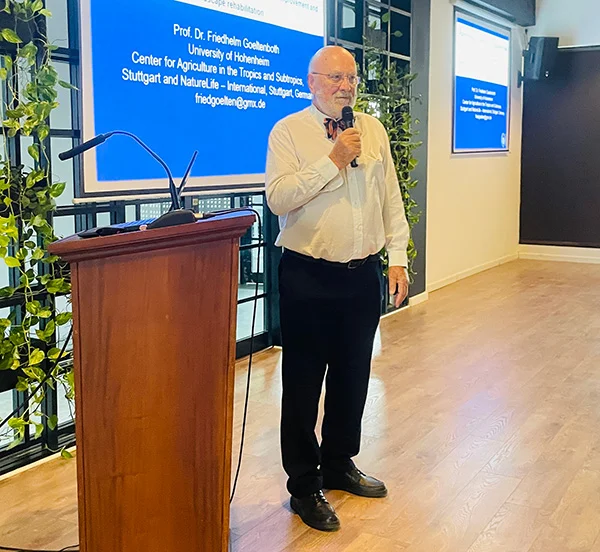Business
One Duty Free now open at Port City Duty Free Mall

One World Duty Free (ODF) is a leading and an omnichannel duty free global travel retail brand that is headquartered in Singapore, proudly announced its latest duty- free store opening at the Port City Duty Free Mall in Colombo on 1 January 2025. This marks a milestone in the ODF’s strategic entry to the South Asian market which is expected to offer its premium shopping experience for international travelers as well local consumers.
ODF eagerly anticipates the completion of the second phase of its Port City Duty-Free store by March 2025. This expansion will fully realize the store’s 12,800 sq. ft. retail footprint, offering an elevated shopping experience.
Keira Zhang, Chief Executive Officer (CEO) of One World Duty Free, stated, “The opening of our flagship store in Sri Lanka’s Port City is a pivotal moment for ODF as we expand into the South Asian market. Our carefully curated selection of world-class brands and categories underscores our dedication to providing travelers with an unmatched retail experience. This initiative also supports Colombo’s transformation into a leading retail and tourism hub.”
ODF envisions for the growth of the emerging markets, the launch of the Port City Duty-Free Mall reflects ODF’s commitment to redefining travel retail through innovation and exceptional customer experiences. This duty free store at the Port City, is expected to attract over 2 million visitors annually demonstrating its position as premier shopping destination.
The Sri Lankan passport holders including dual citizens of Sri Lanka and foreign passport holders with resident visa in Sri Lanka who have returned to Sri Lanka with a valid proof of arrival are eligible for an annual duty-free allowance of $2000. The commencement of the allowance is permitted for 4 days from the first day of the arrival. For tourists with valid foreign passports, they will not be subject to an annual allowance limit and such are eligible to purchase from the duty free store from the date of arrival. Their Purchases can conveniently be collected from the airport pickup counter at Bandaranaike International Airport (BIA). For further information, please contact the ODF hotline at +94 77 504 0064.
Business
‘Sri Lanka’s forests are undervalued economic assets — and markets are paying the price’

Sri Lanka’s economic strategy continues to focus on exports, productivity and fiscal consolidation.
Yet one of the country’s most valuable assets — its forests and traditional forest-based farming systems — remains largely absent from economic planning. This is no longer an environmental oversight. It is a business risk.
At a recent Dilmah Genesis Thought Leadership Series lecture in Colombo, tropical ecology expert Professor Friedhelm Goeltenboth delivered a clear message: once forests are destroyed, the economic value they provide is lost permanently.
What replaces them — monoculture plantations — may appear efficient, but over time they generate declining yields, rising input costs and growing exposure to climate shocks.
From a financial perspective, this is asset depletion, not development.
Monoculture systems simplify production but externalise costs. Soil erosion, fertiliser dependency, water stress and biodiversity loss eventually hit farmers, banks, insurers and the state.
Sri Lanka is already seeing the consequences through falling productivity and rising agricultural vulnerability.
Forest-integrated farming offers a different model — one that treats land as a multi-income asset.
Spices such as cinnamon, pepper, cardamom and nutmeg can be grown under shade alongside fruit, timber and fibre crops, stabilising income while protecting soil and water. For lenders and insurers, diversified systems reduce risk. For exporters, they support traceability, sustainability certification and premium pricing.
The strongest business opportunity lies in carbon markets. Voluntary carbon markets allow companies to offset emissions by funding verified forest conservation and restoration.
Across Southeast Asia, communities now earn income simply by protecting forests that store carbon.
Sri Lanka has the scientific capacity to enter this space. Farmers can collect data; experts can certify it. What is missing is a coordinated national framework that allows communities and corporates to participate efficiently.
Carbon revenue will not replace agriculture, but it can stabilise it — providing income during crop maturation and creating a new form of export: environmental services.
Ignoring this opportunity carries downside risk.
Biodiversity loss, pollinator decline and climate volatility threaten long-term agricultural productivity. Forests are not sentimental assets; they are economic infrastructure.
Sri Lanka’s recovery cannot be built on short-term extraction. If the country wants resilient growth, it must start recognising the real value of what is still standing, he added.
By Ifham Nizam
Business
Pavan Rathnayake earns plaudits of batting coach

Sri Lanka batting coach Vikram Rathour has hailed middle-order batter Pavan Rathnayake as one of the finest players of spin in the modern game, saying the youngster’s nimble footwork and velvet touch were a “breath of fresh air” for a side long troubled by the turning ball.
Drafted in for the second T20I after Sri Lanka’s familiar struggles against spin, Rathnayake looked anything but overawed by England’s seasoned tweakers, skipping down the track with sure feet and working the ball into gaps with soft hands.
“He is one of the better players when it comes to using the feet,” Rathour told reporters. “I haven’t seen too many in this generation do it as well as he does. That is really impressive and a good sign for Sri Lankan cricket.”
Sri Lanka went down in a last-over nail-biter but there were silver linings despite the hosts being a bowler short. Eshan Malinga was forced out after dislocating his left shoulder and has been ruled out for at least four weeks, a blow that ends his World Cup hopes. Dilshan Madushanka, Pramod Madushan and Nuwan Thushara have been placed on standby.
 Power hitting remains Sri Lanka’s Achilles’ heel and Rathour, who carries an impressive CV from India’s T20 World Cup triumph two years ago, pointed to a few grey areas in the batting blueprint.
Power hitting remains Sri Lanka’s Achilles’ heel and Rathour, who carries an impressive CV from India’s T20 World Cup triumph two years ago, pointed to a few grey areas in the batting blueprint.
“There are two components to T20 batting,” he said. “One is power hitting, but the surfaces here, especially in Colombo, are not that conducive to clearing the ropes. The wickets are slow and the ball doesn’t come on to the bat. The other component, just as important, is range as a batting unit.”
Even when Sri Lanka lifted the T20 World Cup in 2014 they were not blessed with a dressing room full of big hitters, relying instead on sharp running, clever placement and a mastery of spin. Rathour preached a similar mantra.
“If you are not a team that hits a lot of sixes, you can still find plenty of fours by utilising the whole ground,” he said. “Most of them sweep well, reverse sweep and use their feet. That is encouraging. If you don’t have the brute power, you can make up for it by using angles and scoring square of the wicket.
“These wickets perhaps suit that style more. They are not the easiest surfaces to hit sixes, and I’m okay with that. If they can use their feet and the angles well, that is as good.”
Rex Clementine
at Pallekele
Business
Unlocking Sri Lanka’s dairy potential

Sri Lanka’s dairy and livestock sector is central to food security, rural livelihoods, and national nutrition, yet continues to face challenges related to productivity, climate vulnerability, market access, and financing.
In this context, Connect to Care and DevPro have entered into a formal partnership through a Memorandum of Understanding (MoU) to support Sri Lanka’s journey towards dairy self-sufficiency.
A core objective of DevPro is to strengthen inclusive and resilient dairy value chains by empowering smallholder farmers through technical assistance, capacity building, climate-resilient practices, and market-oriented approaches, building on its extensive field presence across Sri Lanka.
A core objective of Connect to Care is to support the achievement of dairy self-sufficiency by 2033, as outlined in the national development manifesto, with an interim target of 75% self-sufficiency by 2029.
By strengthening local dairy production and value chains, this effort will also help reduce Sri Lanka’s dependence on imported dairy products, while improving farmer incomes and domestic supply resilience.
The partnership will focus on climate-smart dairy development, multi-stakeholder coordination, and exploring blended finance and PPP models—providing a structured platform for development partners and the private sector to engage in scalable action.
-

 Opinion4 days ago
Opinion4 days agoSri Lanka, the Stars,and statesmen
-

 Business5 days ago
Business5 days agoClimate risks, poverty, and recovery financing in focus at CEPA policy panel
-

 Business3 days ago
Business3 days agoHayleys Mobility ushering in a new era of premium sustainable mobility
-

 Business3 days ago
Business3 days agoAdvice Lab unveils new 13,000+ sqft office, marking major expansion in financial services BPO to Australia
-

 Business3 days ago
Business3 days agoArpico NextGen Mattress gains recognition for innovation
-

 Business2 days ago
Business2 days agoAltair issues over 100+ title deeds post ownership change
-

 Business2 days ago
Business2 days agoSri Lanka opens first country pavilion at London exhibition
-

 Editorial3 days ago
Editorial3 days agoGovt. provoking TUs













